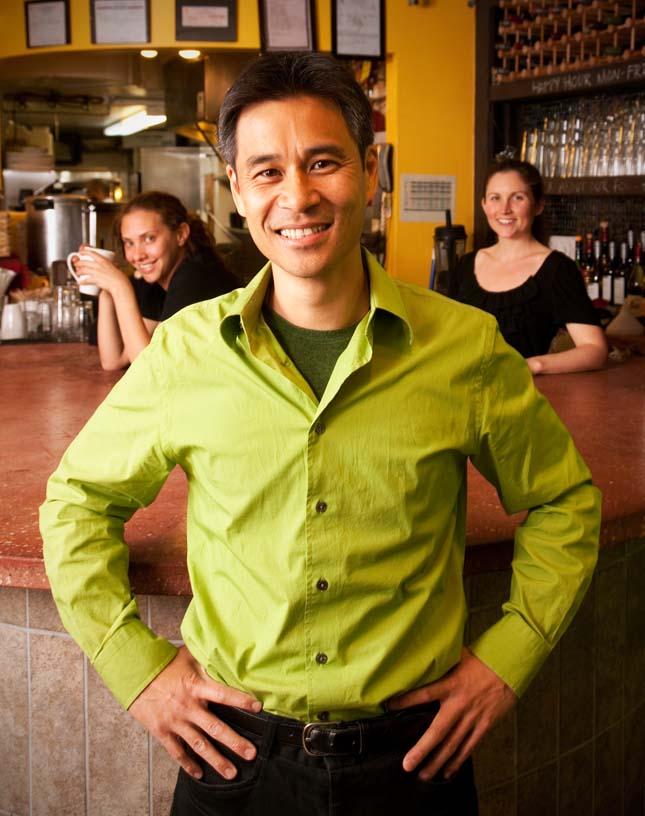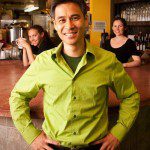DC Lives Green
By • April 20, 2011 0 2422

Five years ago, amid the fragrant scents of vegan and vegetarian dishes at Java Green, a few loyal patrons of the restaurant began to talk. Many of them were environmentalists and the topic on their menu was green business. The goal was to make green living accessible for all DC locals.
Steve Ma, a DC resident who has been doing environmental work for the past 21 years, was one of those patrons. “The owner [of Java Green], D.J. Kim, had this vision of a greener world,” Ma said. “He said, we need to have more green businesses, more green people. We need to be living in green places, working in green places, and we should start a group to do that.”
Ma took that vision to heart. From those conversations the idea for DC Live Green, an online organization designed to make green living simple, was born.
Since its launch in 2008, the site’s mailing list has swelled from about 1,000 to 26,000 subscribers, and the organization has partnered with more than 75 green businesses throughout DC, from cleaning services to yoga studios. To capitalize on its rapidly growing success, the organization was awarded the Environmental Excellence Award in 2009 by Mayor Adrien Fenty, along with many of the businesses that Live Green sponsors.
Through its website, LiveGreen.net, DC Live Green works as a tool for residents to help them find affordable, quality services that are also eco-friendly. For $13 per year, members are given discounts to many of the businesses the organization sponsors. DC Live Green also recently launched its sister site, GreenBacks.LiveGreen.net, a deal site for green products. The system operates similarly to Groupons; each week, Live Green offers subscribers a 40 to 70 percent discount at one of its sponsored green businesses.
“We want people to try green businesses out and know that we screen for not only whether the business is green, but we also make sure the business is high-quality and affordable,” said Ma, whose official title is now Board President and GEO (Green Executive Officer) of DC Live Green. “We want to make sure you realize that being green doesn’t mean you have to lose out on quality or price.”
From their small, wind-powered office building, the DC Live Green team works in a shared space, clustered around desks made from reclaimed doors where they search out, screen, and partner with an ever-expanding list of businesses.
Each candidate is put through a vigorous five-part selection process. This ensures not only that a business’ products are 100 percent green, but that its operations are green, its goods or services are high in quality, their products are competitively priced, and that the business is socially responsible and active in the community.
“We look at all of those things, and when they pass our screening, we know that they are truly on a leading edge. They are what we would identify as triple-bottom-line businesses,” Ma said. “These are businesses that run on the concept that they’re gonna do good for the planet, do good for society, and make money at the same time.”
Yet Ma says DC Live Green is more than just a helpful website. It’s also a place to strengthen and grow Washington’s green community. Aside from its role as a forum for green-minded people, the organization also hosts regular events such as last February’s Single Green Mingle, a chance for eco-friendly singles to meet and exchange ideas and phone numbers. Live Green also helps budding businesses through the greening process, linking them up with other DC businesses that can provide them with environmentally friendly energy and other services.
“We want to build a community,” Ma said. “We want to pull it offline as well; we want people on the online community to interact with each other. I think it can be difficult to think about all of these things and incorporate these things into your life, but when you have a supportive community and know that other people are doing it with you, it makes it a whole lot easier.”
Ma himself works hard to make sure that his personal life is also a good example of green living for the environmentally conscious community. He is a practicing vegan, he walks or bikes most places and, although his neat green button-down and jeans would never betray it, he buys almost all of his clothes from Goodwill and other second-hand stores.
At the age of 17, Ma was introduced to the green community when opportunity literally knocked on his door in his home state of New Jersey. The local Public Interest Research Group was going door-to-door raising awareness about the state’s use of toxic chemicals. Ma seized his chance and joined the campaign, starting his journey from a teenager who ate McDonald’s once a week to a man tackling environmentalism in the nations’ capital.
This year Ma is going even further in his mission to make people aware of the impact they have on the environment by keeping an open record of all his purchases and acquisitions, excluding food, on the Live Green website. He hopes this exercise will not only force him to think twice about the items he buys, but will also inspire others to do the same.
“It’s just a good reminder that one of the things we can do to be green is to reduce the amount of stuff that we buy, and when we do buy things to make sure that they’re either used, or we’re buying the green version of the things that we need,” Ma said. “This is not about telling people that they shouldn’t buy anything ever. I think the point is when we do buy things, just buy them more intentionally.”
But DC Live Green’s objective is not just to help you green your purchases, but your whole life. According to Ma, there are five important aspects to being truly green: transportation, food, energy, stuff and impact. He points to alternatives such as Zipcars, eating less meat and dairy, finding offsets for your home’s energy use, and buying green or used items as simple ways to make your life greener on the whole. Impact refers to the number of people that you encourage to go green with you such as friends, family, or coworkers, from cooking communal vegan dinners or carpooling.
“When you can find those things that are not only easy, but also impactful and very affordable, I feel like that’s where we can spread this movement to millions, to the masses, to all of us. And that’s ultimately our mission,” Ma said. “We want to grow a thriving green economy and transform this struggling, unsustainable economy to one that’s doing very, very well.”
- Jordan Wright
- Steve Ma, founder and GEO (Green Executive Officer) of DC Live Green | Philip Bermingham
- Jordan Wright





